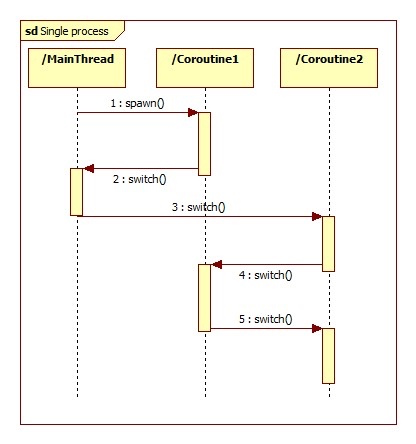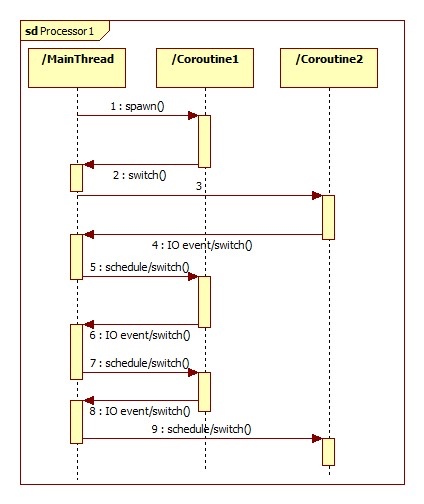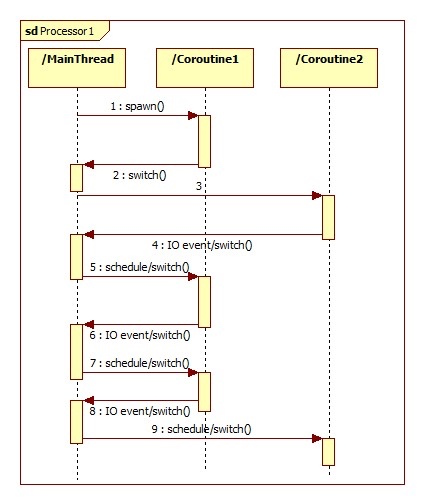文档资源 http://sdiehl.github.io/gevent-tutorial/
一、协程实现
线程和协程
既然我们上面也说了,协程也被称为微线程,下面对比一下协程和线程:
- 线程之间需要上下文切换成本相对协程来说是比较高的,尤其在开启线程较多时,但协程的切换成本非常低。
- 同样的线程的切换更多的是靠操作系统来控制,而协程的执行由我们自己控制
我们通过下面的图更容易理解:


从上图可以看出,协程只是在单一的线程里不同的协程之间切换,其实和线程很像,线程是在一个进程下,不同的线程之间做切换,这也可能是协程称为微线程的原因吧
继续分析协程:

既然Gevent用的是Greenlet,我们通过下图来理解greenlet:

每个协程都有一个parent,最顶层的协程就是man thread或者是当前的线程,每个协程遇到IO的时候就把控制权交给最顶层的协程,它会看那个协程的IO event已经完成,就将控制权给它。
from greenlet import greenlet def test1(x,y): z = gr2.switch(x+y) print(z) def test2(u): print(u) gr1.switch(42) gr1 = greenlet(test1) gr2 = greenlet(test2) gr1.switch("hello",'world')
greenlet(run=None, parent=None): 创建一个greenlet实例.
gr.parent:每一个协程都有一个父协程,当前协程结束后会回到父协程中执行,该 属性默认是创建该协程的协程.
gr.run: 该属性是协程实际运行的代码. run方法结束了,那么该协程也就结束了.
gr.switch(*args, **kwargs): 切换到gr协程.
gr.throw(): 切换到gr协程,接着抛出一个异常.
下面是gevent的一个例子:
import gevent def func1(): print("start func1") gevent.sleep(1) print("end func1") def func2(): print("start func2") gevent.sleep(1) print("end func2") gevent.joinall( [ gevent.spawn(func1), gevent.spawn(func2) ] )
二、多协程
简单的多协程
import gevent def func1(): print("start func1") gevent.sleep(1) print("end func1") def func2(): print("start func2") gevent.sleep(1) print("end func2") gevent.joinall( [ gevent.spawn(func1), gevent.spawn(func2) ] )
joinall(greenlets, timeout=None, raise_error=False, count=None)
Wait for the greenlets to finish.
- Parameters
- Returns
-
A sequence of the greenlets that finished before the timeout (if any) expired
wait(objects=None, timeout=None, count=None)
Wait for objects to become ready or for event loop to finish.
协程间的通信
import gevent from gevent.queue import Queue tasks = Queue() def worker(n): while not tasks.empty(): task = tasks.get() print('Worker %s got task %s' % (n, task)) gevent.sleep(0) print('Quitting time!') def boss(): for i in xrange(1,25): tasks.put_nowait(i) gevent.spawn(boss).join() gevent.joinall([ gevent.spawn(worker, 'steve'), gevent.spawn(worker, 'john'), gevent.spawn(worker, 'nancy'), ])
Worker steve got task 1 Worker john got task 2 Worker nancy got task 3 Worker steve got task 4 Worker john got task 5 Worker nancy got task 6 Worker steve got task 7 Worker john got task 8 Worker nancy got task 9 Worker steve got task 10 Worker john got task 11 Worker nancy got task 12 Worker steve got task 13 Worker john got task 14 Worker nancy got task 15 Worker steve got task 16 Worker john got task 17 Worker nancy got task 18 Worker steve got task 19 Worker john got task 20 Worker nancy got task 21 Worker steve got task 22 Worker john got task 23 Worker nancy got task 24 Quitting time! Quitting time! Quitting time!
get(block=True, timeout=None)-
Remove and return an item from the queue.
If optional args block is true and timeout is
None(the default), block if necessary until an item is available. If timeout is a positive number, it blocks at most timeout seconds and raises the Empty exception if no item was available within that time. Otherwise (block is false), return an item if one is immediately available, else raise the Empty exception (timeout is ignored in that case).
get_nowait()-
Remove and return an item from the queue without blocking.
Only get an item if one is immediately available. Otherwise raise the Empty exception.
peek(block=True, timeout=None)-
Return an item from the queue without removing it.
If optional args block is true and timeout is
None(the default), block if necessary until an item is available. If timeout is a positive number, it blocks at most timeout seconds and raises the Empty exception if no item was available within that time. Otherwise (block is false), return an item if one is immediately available, else raise the Empty exception (timeout is ignored in that case).
peek_nowait()-
Return an item from the queue without blocking.
Only return an item if one is immediately available. Otherwise raise the Empty exception.
put(item, block=True, timeout=None)-
Put an item into the queue.
If optional arg block is true and timeout is
None(the default), block if necessary until a free slot is available. If timeout is a positive number, it blocks at most timeout seconds and raises the Full exception if no free slot was available within that time. Otherwise (block is false), put an item on the queue if a free slot is immediately available, else raise the Full exception (timeout is ignored in that case).
put_nowait(item)-
Put an item into the queue without blocking.
Only enqueue the item if a free slot is immediately available. Otherwise raise the Full exception.
三、协程池
from __future__ import print_function import time import gevent from gevent.threadpool import ThreadPool pool = ThreadPool(3) start = time.time() for _ in range(4): pool.spawn(time.sleep, 1) gevent.wait() delay = time.time() - start print('Running "time.sleep(1)" 4 times with 3 threads. Should take about 2 seconds: %.3fs' % delay)
Add a new task to the threadpool that will run func(*args, **kwargs).
Waits until a slot is available. Creates a new native thread if necessary.
Waits until all outstanding tasks have been completed.
四、协程爬虫实现
普通多协程版本
import gevent
from gevent import monkey
import re import urllib.request from lxml import etree from lxml.cssselect import CSSSelector import lxml.html from lxml import etree from lxml.html.clean import Cleaner import string import requests import json import zipfile, io import math import time from gevent.queue import Queue HEADERS = {#'Accept':"text/html,application/xhtml+xml,application/xml;q=0.9,image/webp,image/apng,*/*;q=0.8", 'User-Agent': 'Mozilla/5.0 (Macintosh; U; Intel Mac OS X 10_6_8; en-us) AppleWebKit/534.50 (KHTML, like Gecko) Version/5.1 Safari/534.50', } # Thread-local state to stored information on locks already acquired def start_urls(tasks,total_page): #生产者 产生用于消费的urls任务列表 url = "https://api.bilibili.com/x/v2/reply?jsonp=jsonp&pn={}&type=1&oid=455312953&sort=2&_=1587372277524" for i in range(1,total_page+1): tasks.put(url.format(i)) return tasks def init_start(): #获取评论列表的总页数 url = "https://api.bilibili.com/x/v2/reply?jsonp=jsonp&pn=1&type=1&oid=455312953&sort=2&_=1587372277524" content = downloader(url) data = json.loads(content.text) total_page = math.ceil(int(data['data']['page']['count'])/int(data['data']['page']['size'])) print(total_page) return total_page def downloader(url): #下载任务 content = requests.get(url,headers=HEADERS) print(content.status_code,type(content.status_code)) return content def work(tasks,n): #消费者 while not tasks.empty(): gevent.sleep(1) try: url = tasks.get() except Exception as e: print('e',e) continue print(url) data = downloader(url) if __name__ == '__main__': total_page = init_start() tasks = Queue() task_urls = start_urls(tasks,total_page) gevent.joinall([gevent.spawn(work,task_urls,i) for i in range(3)])
协程池版本
注意:https://www.v2ex.com/t/308276
import gevent from gevent import monkey
monkey.patchall() import time import json from gevent.queue import Queue from gevent import pool import requests import math # HEADERS = {#'Accept':"text/html,application/xhtml+xml,application/xml;q=0.9,image/webp,image/apng,*/*;q=0.8", 'User-Agent': 'Mozilla/5.0 (Macintosh; U; Intel Mac OS X 10_6_8; en-us) AppleWebKit/534.50 (KHTML, like Gecko) Version/5.1 Safari/534.50', } # Thread-local state to stored information on locks already acquired def start_urls(tasks,total_page): #生产者 产生用于消费的urls任务列表 url = "https://api.bilibili.com/x/v2/reply?jsonp=jsonp&pn={}&type=1&oid=455312953&sort=2&_=1587372277524" for i in range(1,total_page+1): tasks.put(url.format(i)) return tasks def init_start(): #获取评论列表的总页数 url = "https://api.bilibili.com/x/v2/reply?jsonp=jsonp&pn=1&type=1&oid=455312953&sort=2&_=1587372277524" content = downloader(url) data = json.loads(content.text) total_page = math.ceil(int(data['data']['page']['count'])/int(data['data']['page']['size'])) print(total_page) return total_page def downloader(url): #下载任务 content = requests.get(url,headers=HEADERS) print(content.status_code,type(content.status_code)) return content def work(tasks,n): #消费者 while not tasks.empty(): time.sleep(1) try: url = tasks.get() except Exception as e: print('e',e) continue print(url) data = downloader(url) if __name__ == '__main__': total_page = init_start() tasks = Queue() task_urls = start_urls(tasks,total_page) pool = pool.Pool(3) for i in range(3): pool.spawn(work,task_urls,i) pool.join()
五、web服务器与客户端实现